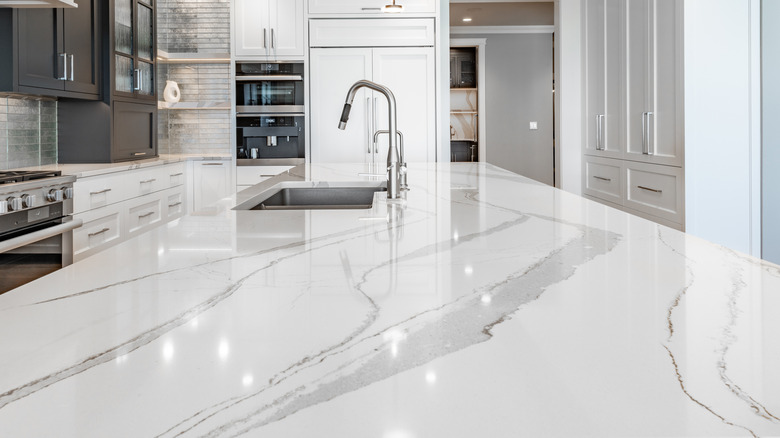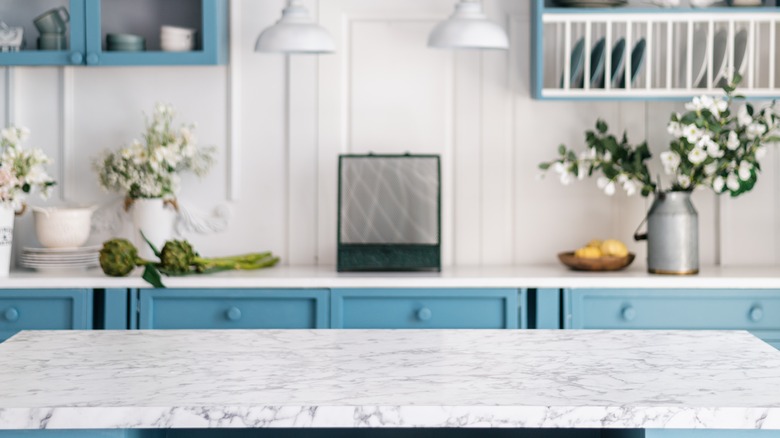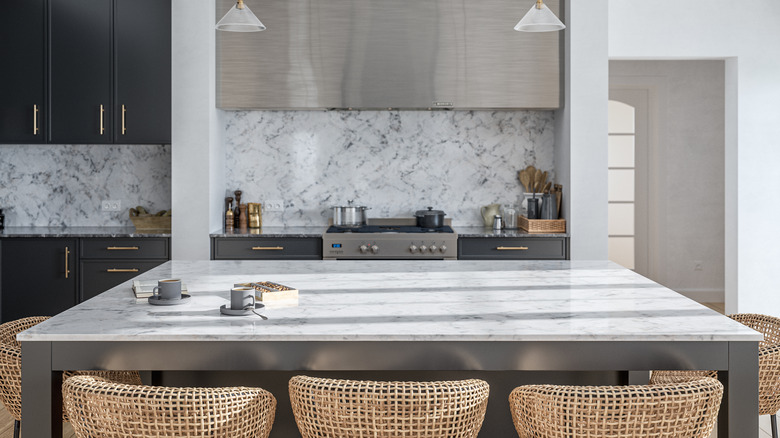Our Real Estate Expert Tells Us The Best Type Of Countertop Material For A Large Kitchen
Between weeknight family dinners and entertaining on the weekends, kitchens see more action than other rooms in the house. The routine traffic and activity mean all kitchen materials, especially the countertop, should be durable. "In my opinion, the best countertop material is either quartzite or quartz materials," Jason Pietruszka, the general contractor, interior designer, and real estate developer of JJP Construction Inc., told House Digest in an exclusive interview. "Quartz is a durable material that is perfect for kitchens. It is not a porous product, so issues with usage on this counter [are] not as much of a concern, i.e., spilling red wine."
Quartz is a manufactured stone rather than a natural one. The engineered slabs are made with crushed quartz crystals combined with resins and pigments. The resin helps to fill the holes naturally occurring in quartz, which makes the countertop resistant to staining. But durability is only one reason to love quartz in the kitchen. According to Pietruszka, "It is also available in so many different colors and patterns, and a lot of them match true marble intonations."
He said since quartz is an engineered material, it's also relatively easy to manufacture slabs with matching or continuous veining patterns — a practice known as "bookmatching." Bookmatched quartz is a benefit for large kitchens that may feature expansive islands or long swarths of countertops that would look stunning with a seamless design.
Are there alternatives to quartz?
Of course, there is no perfect countertop material, so even quartz has downsides. "The downside with this material is that it can be difficult to repair if you have a crack in it or a chipped corner," Jason Pietruszka told House Digest. However, cracks and chips are not common with quartz and often occur after improper installation, low-quality materials, extreme temperatures, or being hit by a heavy object. As long as you take care to maintain the stone, it should stay in good shape for years to come.
Because marble is porous, it's not always the best material for the kitchen. However, quartz's non-porous nature and some slabs' ability to appear like marble make it a good alternative. "It doesn't look fake like a porcelain slab, but sometimes it can be obvious that it is not 100% authentic marble," warned Pietruszka. "So you do have to be cautious of the product and look you are going for."
As for alternatives to quartz, Pietruszka said, "I would only ever recommend natural stones, porcelain (but only for backsplashes!!), or quartzite. If I had to pick a top recommendation, quartzite would be it. It is basically a quartz slab, but they mix in real pieces of natural marble. This ends up enhancing the look and feel of the product tremendously. You get all the benefits of using quartz, but the upgrade of having it look so much closer to real marble."
Choosing slabs for countertops
Countertops are one of the most important materials of a kitchen, which can make shopping for one an overwhelming process. "Picking slabs can be such a fun experience. The colors and options can feel endless, though," noted Jason Pietruszka. "Go into picking out your products and materials with a mission in mind. Focus on your needs first and then take looks (beauty) into consideration. I always say, function over form!" You want to ensure that your countertop is going to stand up to the daily wear and tear that kitchens often ensure while also contributing to the aesthetic of the room.
In order to find the right countertop for your home, Pietruszka suggested Home Digest readers ask themselves these questions: "What kind of kitchen user are you? Do you cook a lot, do you order out, do you entertain often?" Identifying the way you use your kitchen can help guide you as you search through what can seem like endless options. You'll also want to consider the style of the room to help inform the color, veining, and pattern of the quartz slab. "All of these questions lead to answers that will point you in the best direction forward for your kitchen."


